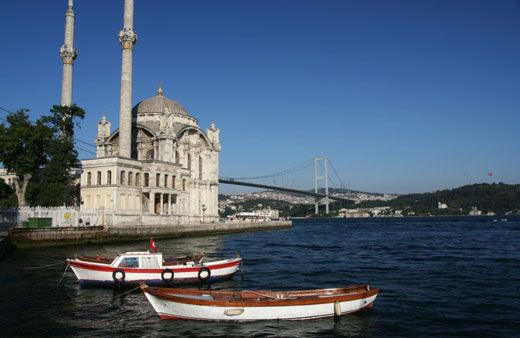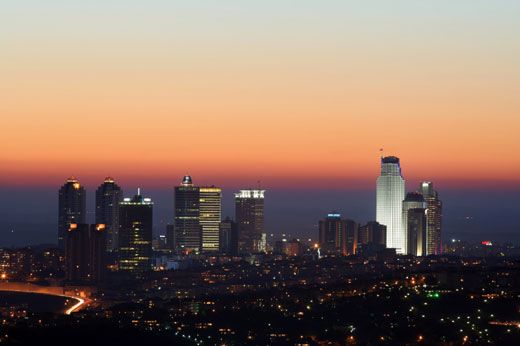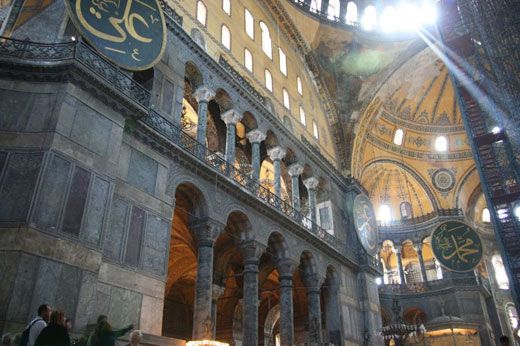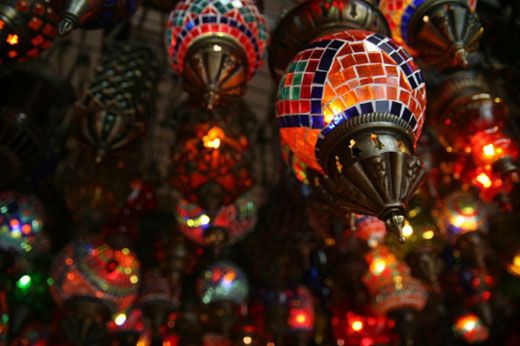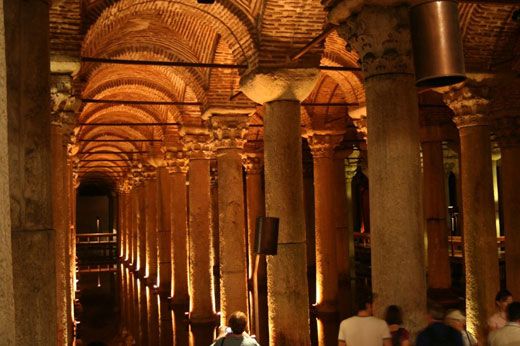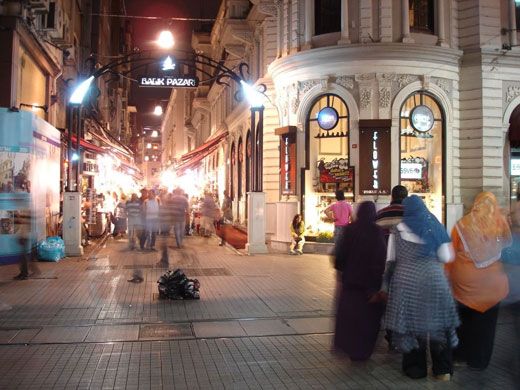Snapshot: Istanbul
Istanbul’s vastly growing population and blending of cultures make it one of the most dynamic cities in the world
/https://tf-cmsv2-smithsonianmag-media.s3.amazonaws.com/filer/instanbul_snapshot_631.jpg)
With a skyline studded with domes and minarets, Istanbul is one of the truly great romantic cities. In Turkey's largest city, the continents of Europe and Asia come together as West meets East, separated only by the 18 miles of the Bosporus Strait that stretches from the Black Sea in the north to the Sea of Marmara in the south. And in the less literal sense, on the vibrant streets of this city of 12 million people, miniskirts and trendy boots mingle with colorful Muslim head scarves and prayer beads.
Origins:
Istanbul is a treasure trove of history still being uncovered. Archaeological remains show that people have inhabited the immediate area of present-day Istanbul for tens of thousands of years. In 2008, during the construction of the new Marmaray rail tunnel (connecting the European and Asian sides of Istanbul), a previously unknown settlement dating from 6500 BC has been discovered. In its long history, Istanbul served as the capital city of the Roman Empire (330–395), the Byzantine Empire (395–1204 and 1261–1453), the Latin Empire (1204–1261), and the Ottoman Empire (1453–1922). The city was recently chosen as joint European Capital of Culture for 2010. Istanbul has continued to expand dramatically; today its population is approximately 13 million and increases at an estimated 700,000 immigrants per year. Industry has expanded even as tourism has grown. It continues to be a city that creates its own history at the intersection where both continents meet.
Then and Now:
Istanbul's history traces back from Byzantium to Constantinople to its place as capital of the Ottoman Empire, the most powerful Islamic empire in the world. Today it pulsates as Turkey's cultural heart and business center. Urban sprawl has created an Istanbul larger in area than the state of Rhode Island and more populous than all of Greece or Belgium.
Turkey continues to be the center of news and some controversy. In October 2005 negotiations began between Turkey and the European Union for Turkey to be considered as a possible member of the EU in the future. A conflict persists between the 20-25% Kurdish population and the Turkish government. For many citizens, women's dress has become an issue that defines whether a Muslim is secularist or religious. Headscarves, worn by many women for religious reasons, are symbolic of a cultural clash in government between conservatives and modernists.
Appeal:
Istanbul is a jewel box of old and new. Skyscrapers and some of Europe's largest shopping malls cater to the more affluent set while the old quarter, parts of which are on the UNESCO World Heritage List, continues to dazzle locals and tourists alike with its cobblestone streets, awe-inspiring centuries-old mosques, and the grandeur of the Topkapi Palace which was the official and primary residence of the Ottoman Sultans, from 1465 to 1853. Considered to be the world's fourth largest cathedral, the magnificent Hagia Sophia museum was originally built by Byzantine Emperor Justinian in 537 AD. Originally a Byzantine church and later an Ottoman mosque, this marvel is universally acknowledged as one of the great buildings of the world. Across this growing city, you can explore the streets where crusaders once marched; admire mosques that are the most sublime architectural expressions of Islamic piety; peer into the sultan's harem; and hunt for bargains in the world's original shopping mall, the Grand Bazaar, one of the largest covered markets in the world with more than 58 streets and 6,000 shops, and between 250,000 and 400,000 visitors daily.
Who Goes Here:
Istanbul's appeal among tourists is a result of the vibrant cultures that have flourished in the city and the melting pot of different religions that have existed side by side throughout history. In 2007, more than twenty-seven million tourists visited Turkey. In the lively and historical city of Istanbul, there are thousands of hotels and other tourist oriented industries in the city, catering to both vacationers and visiting professionals. As one of the world's fastest growing economies, and Turkey's financial capital, Istanbul has also become a large center for business and business travelers. According to Forbes magazine, Istanbul had a total of 35 billionaires as of March 2008, ranking 4th in the world behind Moscow (74 billionaires), New York City (71 billionaires) and London (36 billionaires).
Famous Sons and Daughters:
Elia Kazan (September 7, 1909 – September 28, 2003) was born Elias Kazanjoglou in the capital city of the Ottoman Empire, Constantinople (modern-day Istanbul) to a Greek family. He was an Academy Award-winning film and theatre director, Tony Award-winning theatrical producer, screenwriter, novelist and cofounder of the influential Actors Studio in New York in 1947. He directed such Broadway plays as A Streetcar Named Desire and Cat on a Hot Tin Roof. He directed the film version of A Streetcar Named Desire, On the Waterfront, and many other films.
Ferit Orhan Pamuk (born June 7, 1952 in Istanbul) is a Turkish novelist and professor of comparative literature at Columbia University. Pamuk is one of Turkey's most prominent novelists and his work has sold over seven million books in more than fifty languages, making him the country's best-selling writer. His fourth novel, New Life, became the fastest-selling book in Turkish history. Pamuk's novel Kar (English translation, Snow), explores the conflict between Islamism and Westernism in modern Turkey. The New York Times listed Snow as one of its Ten Best Books of 2004. Pamuk is the recipient of numerous national and international literary awards. He was awarded the Nobel Prize in Literature in 2006, becoming the first Turkish person to receive a Nobel Prize.
Hidayet Türkoğlu, commonly referred to as Hedo Turkoglu (born March 19, 1979, in Istanbul, Turkey) is an NBA basketball player for the Orlando Magic. He stands 6 feet 10 inches tall and won the NBA's Most Improved Player Award for the 2007-2008 NBA Season. Basketball is rapidly gaining popularity in Turkey. In fact, the Turkey national basketball team came in second in the European Basketball Championship in 2001 in Istanbul and in 2010 Istanbul will host the 2010 FIBA (International Basketball Federation) World Championship.
Ahmet Ertegün (July 31,1923 – December 14, 2006) was the son of the Turkish Ambassador to the United States. He was born in Istanbul and moved to the United States where he became the co-founder and executive of Atlantic Records, where he wrote and produced music, defined careers and changed lives. He is described as "one of the most significant figures in the modern recording industry.” By the mid 1950s, Atlantic had become the country's preeminent R&B label producing hits by such artists as Ray Charles and the Drifters. The "Atlantic Sound"—a boogie-based, sax-led band arrangement that became an integral part of rhythm and blues—grew into a phenomenon that swept across the nation and the world. In 1987, Ertegün was inducted into the Rock & Roll Hall of Fame, of which he himself was a founder.
Interesting Facts:
Turkey sits directly on at least three active earthquake faults. Thirteen major quakes have rocked Turkey since 1939—the latest was a 7.4 magnitude whopper in 1999 which killed more than 18,000 people. Istanbul straddles one of the most active seismic fault lines on the globe. A few miles away beneath the Marmara Sea, the North Anatolian fault line is stirring, and scientists are predicting a major rupture within the next few decades and say the question is not 'if', but 'when?'
The secular country of Turkey was founded by Mustafa Kemal Atatürk who was an army officer, revolutionary statesman, and its first President. An admirer of the Enlightenment, Atatürk instituted wide-ranging and progressive political, economic, and social reforms, transforming Turkish society into a modern, democratic, and secular nation-state. Atatürk also worked to solve the literacy problem, creating a Language Commission, which developed a brand new Turkish alphabet using the Roman alphabet in 1928.
The American doughnut shop operator Krispy Kreme announced in 2008 that it will franchise about 25 outlets in Istanbul that will open in the next five years.
